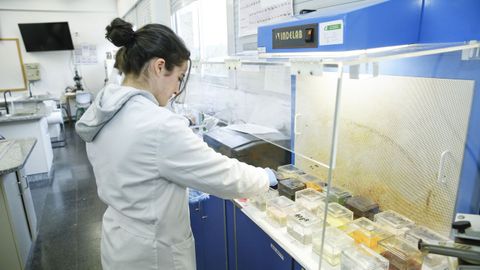
Author: PACO RODRIGUEZ
The maximum cost to the company will be 60 euros per month, and training periods in the last two years can be recognized
Students who do internships in companies from October 1 are guaranteed that all these periods will be counted in their working life, so they will also be counted in their seniority for retirement.
Within the framework of the law on the decree on pension reform, published last week in State official gazetteThe government determines “inclusion in the system of Social security students who do it training practices or external academic internships included in training programs. The provision will affect those scholarship recipients who are pursuing university studies or professional training, except in the case FP intensive (dual), also in those cases where the internship is unpaid.
Students will be included in the General Social Security Scheme, except for those who are training on board, in which case they will be included in the Special Scheme for Maritime Workers. But who will contribute for them? In the case of a paid internship, “compliance with social security obligations [es decir, de tramitar el alta y la baja y de abonar las cotizaciones] It will correspond to the entity or body funding the training programme”, for example the relevant university. In the case of an unpaid internship, it will be the company that must make a contribution for the students.
In any case, the bill will not be large because the benefits do not cover the same benefits as for a regular worker and will be almost entirely subsidized. In this way, internship students will not have unemployment insurance, the Salary Guarantee Fund or professional training. However, they will be protected in case of normal and professional contingencies in case of unpaid internship, he will not be entitled to compensation for temporary incapacity in case of ordinary illness. On the other hand, they will have access to benefits for the birth and care of the child, the risk during pregnancy and breastfeeding, which “will be paid by the managing entity or, as appropriate, the mutual”.
As for the costs to the company, the regulation provides a 95% reduction in fee for common contingencieswhich in the first three months of application of the standard, between October 1 and December 31 this year, will rise to 97%.
In the case of paid internships, the applicable contribution base will be minimal (currently 1,260 euros per month), and students on internships will be excluded from the contribution to the mechanism of intergenerational equality (MEI), a supplement to fill the piggy bank pension which now stands at 0.6%, but which will grow in the coming years until it reaches 1.2%.
In case of unpaid stipend, the company will have to pay a daily allowance for normal contingencies and another to cover a possible accident at work or occupational disease. In the first quarter of the application of the standard, they will amount to 2.36 and 0.29 euros per day, in addition joint cap of 60.1 euros per month for both concepts.
For benefit purposes, each day of unpaid training practice will count as 1.61 contribution days, although the number of calendar days in the applicable month may not be exceeded in any event.
Regulate existing practices
The obligation for companies to enroll students doing unpaid internships (paid internships were already regulated) has been enshrined in law since the end of 2018, when the measure was included in a royal decree that, however, has not yet been approved. developed, which, according to the ministry, justifies the “urgent and extraordinary need” to include this provision in the decree on pension reform.
Although its entry into force has been delayed until October 1, the regulation foresees that those students who did an internship for which they were not registered in the social security in the previous two years (that is, from October 1, 2021) can subscribe to special agreement with social security that allows them to add these periods of training in companies to their working life. The deadline, terms and conditions for this recognition will be determined by the Ministry of Social Security in the coming months.
Likewise, the norm foresees that before the end of June, an observatory will be established to monitor these measures to contribute to training practices, in which representatives of the ministries of education, universities and social security, together with others from employers and trade unions, will participate. For its part, the Administration is also speaking plans to combat fraud in training practices which in reality hide structural affairs.
Source: La Vozde Galicia
I am Jason Root, author with 24 Instant News. I specialize in the Economy section, and have been writing for this sector for the past three years. My work focuses on the latest economic developments around the world and how these developments impact businesses and people’s lives. I also write about current trends in economics, business strategies and investments.







